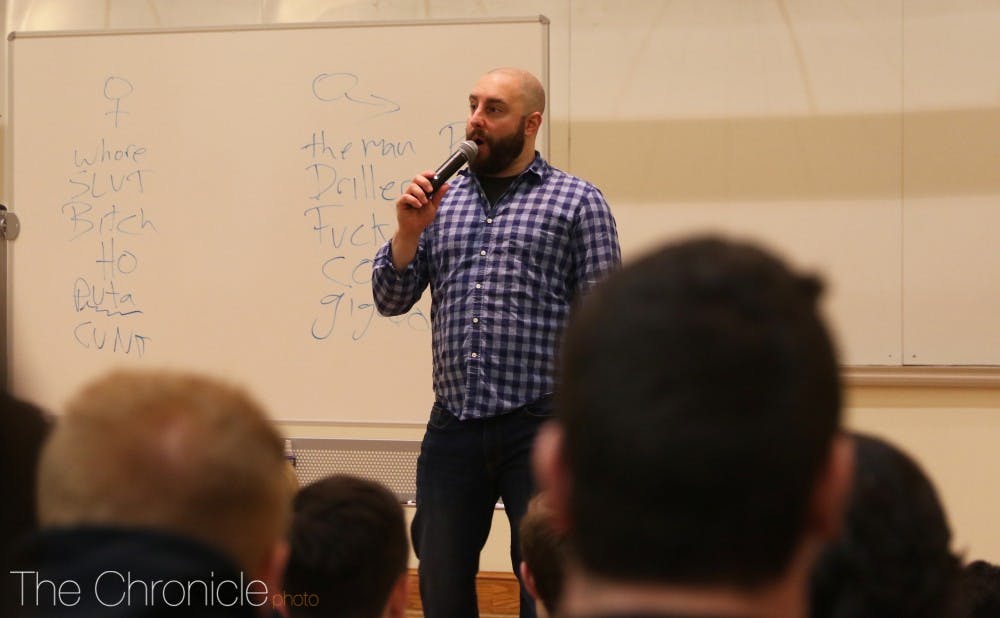George Zerante scrawled two lists on a board in White Lecture Hall, writing out the responses to a simple prompt—what words do you hear used to describe women who have sex and men who have sex? The left list—whore, slut, b*tch, ho and puta—was used for descriptions of women, the right list—driller, the man, player, gigolo, f*ck boi—was used for men.
The purpose of the exercise was to start a discussion about how language and social culture affect sexual assault survivors and perpetrators.
Zerante, an educator for Catharsis productions, held two hour-long sessions in a predominantly male room Monday aimed at preventing sexual violence on campus. The event, called “The Hook Up: Preventing Sexual Violence," was hosted by the Peer Advocacy for Sexual Health, the Women’s Center and the Student Wellness Center, among several other groups.
“Yeah, we are going to talk about rape. But before, I’m going to tell you about what we’re not going to talk about when it comes to sexual assault,” Zerante said. “We’re not going to talk about all men being dirty rapists. We’re not going to talk about men needing to apologize for their penises. I don’t apologize for my penis. I love my penis. We’re not going to talk about how women need to know self-defense…We’re not going to victim-blame, can we agree on that?”
When he prodded the audience to raise their hands if they had come to the talk because they wanted to be there, about half raised their hands.
“Nice, 50 percent,” he said. “Now how many of you were told to be here?”
The event was open to the general Duke community but was aimed at new members joining fraternities. One fraternity, Delta Sigma Phi, invited all their members to come, explained Theresa Survillion, assistant director for the Office of Fraternity and Sorority Life.
Using the list of words as a springboard, Zerante pushed the audience to recognize the effects the terms have on their lives and their perceptions of others. The right column describing the boys gets its power by taking it away from the left list, he explained, pointing to the implied power dynamic articulated by a “player and a ho” pairing.
The language used to describe women, he said, objectifies them, and the labels used for men put pressure on them to have sex and conform. The end result is a community being desensitized by this type of language.
“The language we have deters us from being good people,” Zerante said.
When he asked if they had heard the terms used on campus and in their fraternities, Zerante got a handful of nods from the audience.
Zerante went on to discuss the distinctions between a good hookup, a bad hookup and rape—and ways to prevent the latter.
A good hookup, he said, is safe, fun and consensual. He noted that consent needs to be active and ongoing and that communication is an important part of a good experience. A bad hookup is not fun or something you regret, but it is still consensual.
When the consent is absent, Zarente explained, that’s not a bad hookup—that is rape.
“Rape is not wrong because it’s illegal,” he said. “It’s illegal because it’s wrong.”
He noted that in fraternities, sometimes hazing can escalate into sexual assault and the cyclical nature of hazing can lead to its perpetuation, with it being brushed off as a “right of passage” or “tradition.”
Zerante also walked the students through the process a sexual predator goes through when preparing to commit an assault—including choosing a target, grooming them and physically isolating them. He then discussed different strategies for preventing an escalation when students notice creepy behavior.
Tom Szigethy, associate dean director of DuWell, said the organization has been trying different ways to drive down the number of sexual assaults on campus but noted that it’s hard to get men to the table. By making the event as interactive as possible, DuWell hopes to get more involved.
By ensuring that new fraternity members go through the session, Survillion also said she hopes the event will empower them to stand up to older members on the issues if necessary. Survillion noted that one of the larger points Zerante was getting at, outside of the in-the-moment ways to prevent assault, is how to change the campus culture to make sexual violence less acceptable.
Zerante's discussion of the language used to describe men and women, she noted, plays a big role in that.
Get The Chronicle straight to your inbox
Signup for our weekly newsletter. Cancel at any time.
Bre is a senior political science major from South Carolina, and she is the current video editor, special projects editor and recruitment chair for The Chronicle. She is also an associate photography editor and an investigations editor. Previously, she was the editor-in-chief and local and national news department head.
Twitter: @brebradham
Email: breanna.bradham@duke.edu

